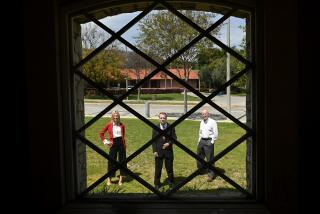No Violation of State Law : Downey Wins Ruling on Land Sale to Church
- Share via
DOWNEY — State officials say the City Council’s sale of land to the First Baptist Church a year ago did not violate state conflict-of-interest laws merely because two councilmen were members of the church.
Responding to a resident’s complaint, officials of the state Fair Political Practices Commission said that council members Robert Cormack and James Quinn would have had a conflict only if they had a personal financial interest in the sale. Under state law, officials said, a personal financial interest is defined as at least $1,000 in holdings or a minimum of $250 in income.
Last June 26, the council sold a vacant 60,000-square-foot lot at Firestone Boulevard and Dolan Avenue to Shepherd Development, a corporation owned by the church, for $744,128, although another bidder for the property, Sizzler restaurants, had offered the city $859,162, said James Cutts, city director of community development. A lawyer for Shepherd, Richard Salyer of Downey, said the church plans to break ground in July for a 30,000-square-foot commercial office building.
Although the Fair Political Practices Commission found no violations of state law, a commission lawyer said, that other council actions affecting the sale may have violated city laws.
The comments were made by Sandra R. Moorehead, a counsel in the commission’s enforcement division, in a letter to retired physician Wilbert Hill, the resident who complained to the commission. In the letter, Moorehead wrote, “the facts set forth in your letter do not suggest a violation of the (state) Political Reform Act. However they do suggest possible violations of the City of Downey charter.”
The night the council approved the land sale, newly elected council members Diane Boggs and James Santangelo asked to be seated on the council. The two new members, who had publicly questioned the sale, were turned down by Cormack, who was then mayor. The council subsequently approved the sale that night by a 4-1 vote. Councilman Bob Davila cast the dissenting vote.
Boggs and Santangelo, elected to the council June 5, said they should have been allowed to take office because the City Charter states that a council member should take office “the first Tuesday following his election.” But Cormack said the city traditionally has seated council members the first Tuesday after their election has been certified by the county registrar of voters, which was July 3.
“History is what we went by,” Cormack said, adding that Boggs and Santangelo “were seated in the same manner that we had been seated ourselves.”
“There was no violation of the charter,” City Atty. Carl Newton said. He added, though, that the issue may be ruled on in a lawsuit filed against the city by Downey CARES, a residents’ group that opposes the city’s plans to redevelop 380 acres along Firestone Boulevard.
In the suit, which is scheduled for a hearing June 28 in Los Angeles Superior Court, the residents’ group contends that the council’s preliminary approval of the redevelopment district June 26, 1984, should be invalidated because Boggs and Santangelo were not allowed to take their seats. The two had defeated incumbents Theodore Jackman and Quinn who participated in the June 26 meeting.
In an interview, Cormack denied that he had shown any favoritism toward the First Baptist Church, of which he is a member and where he has served in the past on the board of trustees and as a member of the church men’s club. The church is the largest one in Downey with more than 2,000 members.
“The majority of the council looked at the issue very carefully and made the decision based on what was best for Downey,” Cormack said. “There was no favoritism.”
Cormack said the church needed the land for additional parking space, and that city officials decided they would not “allow that big old church to become derelict” without necessary parking.
The church, which holds its activities on Sundays and weeknights, plans to share 218 parking spaces with the office building that will be used from 9 a.m. to 5 p.m. on weekdays, said Salyer, Shepherd’s lawyer.
“The church has been here for 110 years and will probably be here for 110 more,” said Cormack, who added that the only way he profits from his association with the church is “by enlightenment.”
More to Read
Sign up for Essential California
The most important California stories and recommendations in your inbox every morning.
You may occasionally receive promotional content from the Los Angeles Times.













